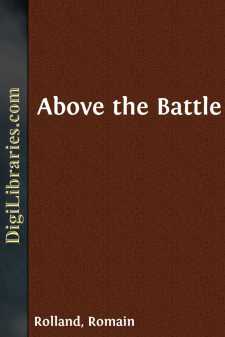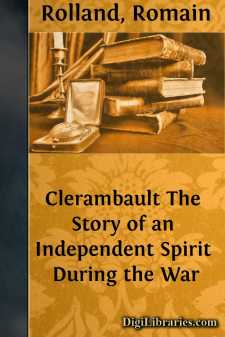Categories
- Antiques & Collectibles 13
- Architecture 36
- Art 48
- Bibles 22
- Biography & Autobiography 813
- Body, Mind & Spirit 142
- Business & Economics 28
- Children's Books 16
- Children's Fiction 13
- Computers 4
- Cooking 94
- Crafts & Hobbies 4
- Drama 346
- Education 46
- Family & Relationships 57
- Fiction 11829
- Games 19
- Gardening 17
- Health & Fitness 34
- History 1377
- House & Home 1
- Humor 147
- Juvenile Fiction 1873
- Juvenile Nonfiction 202
- Language Arts & Disciplines 88
- Law 16
- Literary Collections 686
- Literary Criticism 179
- Mathematics 13
- Medical 41
- Music 40
- Nature 179
- Non-Classifiable 1768
- Performing Arts 7
- Periodicals 1453
- Philosophy 64
- Photography 2
- Poetry 896
- Political Science 203
- Psychology 42
- Reference 154
- Religion 513
- Science 126
- Self-Help 84
- Social Science 81
- Sports & Recreation 34
- Study Aids 3
- Technology & Engineering 59
- Transportation 23
- Travel 463
- True Crime 29
Above the Battle
by: Romain Rolland
Description:
Excerpt
INTRODUCTION
"Over the carnage rose prophetic a voice,Be not dishearten'd, affection shall solve the problem of freedom yet.. . . . . . . . .(Were you looking to be held together by lawyers?Or by an agreement on a paper? or by arms?Nay, nor the world, nor any living thing, will so cohere.)"These lines of Walt Whitman will be recalled by many who read the following pages: for not only does Rolland himself refer to Whitman in his brief Introduction, but, were it not for a certain bizarrerie apart from their context, the words "Over the Carnage" might perhaps have stood on the cover of this volume as a striking variant on Au-dessus de la Mêlée.
Yet though the voice comes to us over the carnage, its message is not marred by the passions of the moment. After eighteen months of war we are learning{8} to look about us more calmly, and to distinguish amid the ruins those of Europe's intellectual leaders who have not been swept off their feet by the fury of the tempest. Almost alone Romain Rolland has stood the test. The two main characteristics which strike us in all that he writes are lucidity and common sense—the qualities most needed by every one in thought upon the war. But there is another feature of Rolland's work which contributes to its universal appeal. He describes our feelings and sensations in the presence of a given situation, not what actually passes before our eyes: he describes the effects and causes of things, but not the things themselves. Through his work for the Agence internationale des prisonniers de guerre, to which one of the articles now collected is largely devoted, he is, moreover, in a position to observe every phase of the great battle between ideals and between nations which fills him with such anguish and indignation. And with his matchless insight and sympathy he gives permanent form to our vague feelings in these noble and inspiring essays.
It will not, however, surprise the vast public who have read Jean-Christophe to find that while so many have capitulated to the madness of the terrible{9} year through which we have passed, Rolland has remained firm, and has surpassed himself. He was prepared. As the extract placed at the beginning of this volume shows, he was one of the few who realized only too well the horror he was powerless to prevent. Yet he made every effort to open the eyes of Europe and especially of the young, so many of whom had learned to look up to him as a leader. To these young men, one of the finest essays in the present collection is primarily addressed—O jeunesse héroique du monde....
Eighteen months have passed and they still endure the terrible ordeal, the young men of Germany and France, whom he had striven so hard to bring together; on whose aspirations and failings Jean-Christophe is a critical commentary. The movements and tendencies of society were there given a dramatic embodiment, permeated for Rolland by the Life Force—that struggle between Good and Bad, Love and Hatred, which makes life worth living. All is set down with the clear analysis of feeling natural to a musical critic. But in spite of his burning words on the destruction of Rheims, Rolland, as is clear from his other critical and biographical writings, is more interested in men than{10} in their achievements. And the men of today interest him most passionately. "Young men," he has said, "do not bother about the old people. Make a stepping-stone of our bodies and go forward."
And above all it is the permanent things in life with which he is concerned. As Mr. Lowes Dickinson puts it, "M. Rolland is one of the many who believe, though their voice for the moment may be silenced, that the spiritual forces that are important and ought to prevail are the international ones; that co-operation, not war, is the right destiny of nations; and that all that is valuable in each people may be maintained in and by friendly intercourse with the others....



